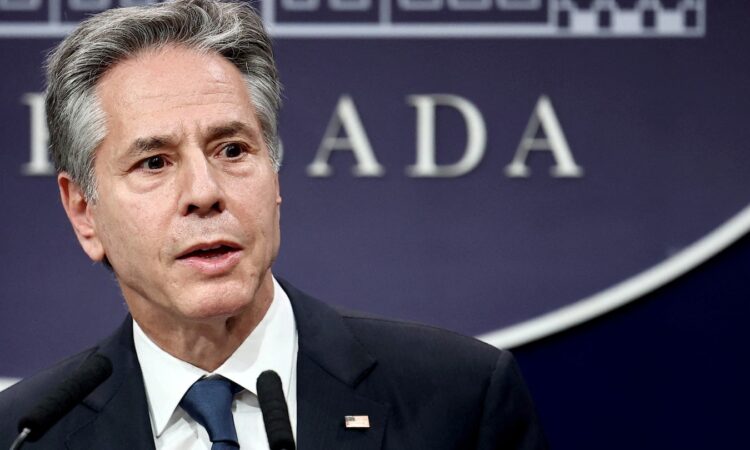
The decision — which was also announced at the White House — was in immediate response to reports that the far-right government of Israeli Prime Minister Benjamin Netanyahu was planning further settlement expansion, according to a U.S. official, one of several who discussed the decision on the condition of anonymity under administration rules.
Far-right Israeli Finance Minister Bezalel Smotrich announced plans late Thursday for approval of 3,000 new settlement homes after Israeli police said Palestinian gunmen opened fire near the existing Maale Adumim settlement, killing one Israeli and wounding five. The expansion plans, he said, were part of “deepening our eternal grip on the entire Land of Israel.”
“This is outrageous” after all the U.S. backing the Israeli government has received in the past several months, a former Biden official said. “For Smotrich to go and do this is just basically an F-you.”
U.S. officials said the decision to clarify Washington’s position on settlements had already been researched and planned as part of recent measures designed to express the administration’s growing discomfort with Israeli actions in Gaza and the West Bank — beginning with visa restrictions announced in December on settlers who used violence and undermined security in the West Bank.
In February, President Biden issued an executive order authorizing financial sanctions against four named settlers, followed a week later by a national security memorandum reminding recipients of U.S. weapons of the need to comply with U.S. and international law.
White House spokesman John Kirby, within minutes of Blinken’s remarks in Argentina, told reporters in Washington that the decision to declare settlements illegal put the Biden administration in harmony with previous U.S. administrations — with the exception being Trump’s.
“We are simply reaffirming the fundamental conclusion that these settlements are inconsistent with international law,” he said. “This is a position that has been consistent over a range of Republican and Democratic administrations — if there’s an administration that is being inconsistent, it was the previous one.”
The statement calling Israeli settlements on occupied territory illegal returns U.S. policy to where it had been since 1978, when a State Department legal opinion declared them “inconsistent with international law.” That opinion, issued under the Carter administration, said that “territory coming under control of a belligerent occupant does not thereby become its sovereign territory.”
At the time, there were an estimated 75 Israeli settlements in Gaza and the West Bank. Now, there are at least 146 settlements the Israeli government has authorized in the West Bank, not including East Jerusalem, along with 144 that are not officially recognized, according to Peace Now, an Israeli organization that advocates a two-state solution.
The 1978 policy was upheld under all subsequent administrations, although many preferred euphemisms such as saying settlements were an “obstacle to peace.” In 2005, Israel withdrew its settlements from Gaza.
In 2019, however, Trump’s secretary of state, Mike Pompeo declared that the United States no longer considered settlements a violation of international law, although he never directed the issuing of a new legal opinion.
Under an unrealized Trump peace plan, Israel would have been allowed sovereignty over all existing settlements and permitted to annex up to 30 percent of the West Bank. During his 2020 presidential campaign, Biden said his policy would be grounded in his commitment to a two-state solution for Israel and Palestine but did not commit to reversing Trump’s actions, which included moving the U.S. Embassy from Tel Aviv to Jerusalem and recognizing Israel’s annexation of the Golan Heights from Syria.
During his first visit to Israel as secretary of state in May 2021, Blinken said the Biden administration opposed “any steps” — including new settlements — that risked “sparking violence” or undermined “the prospect for returning to the pursuit of two states.” Much of the new construction undertaken and proposed by the Netanyahu government is the expansion of existing settlements.
In February last year, a joint statement issued by the United States, Palestinian, Israeli, Egyptian and Jordanian officials after a summit held in the Jordanian city of Aqaba said Israel pledged to “stop discussion of any new settlement units for four months and to stop authorization of any outposts for six months.”
Immediately afterward, however, Smotrich announced that “there won’t be a freeze on construction and development, not even for one day.”
Violence has grown exponentially on the West Bank, where there are now at least 700,000 Israeli settlers, since the Oct. 7 Hamas attacks in southern Israel that killed about 1,200 Israelis. That sparked Israel’s ongoing military operations in Gaza, where nearly 30,000 Palestinians have been killed, according to Gaza health authorities.
Since the start of the war, according to the United Nations, 399 Palestinians have been killed in conflict-related incidents across the West Bank and East Jerusalem, including 102 children, and 4,545 Palestinians have been injured, including 702 children.
During the same period, 13 Israelis, including four members of the Israeli military, were killed and 86 injured.
The Biden administration “tried very hard not to get into any of this,” calling settlements “unhelpful,” said Jeremy Ben-Ami, president of J-Street, a liberal policy group on Israeli-Palestinian issues. “The last 4½ months does go to show that this is not an issue you can ignore. It is going to explode if you don’t do something.”
DeYoung reported from Washington.
